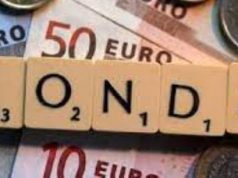OCTOBER 11, 2018 – It was a black Wednesday as stocks on Wall Street fell to their lowest level in 8 months and in major world markets, slid to a three-month low, with the benchmark S&P500 stock index falling more than 3.0 percent, its biggest one-day fall since February.
Technology shares tumbled on fears of slowing demand, while bond yields ended lower after seeing multi-year highs earlier this week.
Despite the concerns, White House said U.S. economic fundamentals remain strong and the future of the American economy is bright.
“Unemployment is at a fifty year low, taxes for families and businesses have been cut, regulations and red tape have been slashed,” White House spokeswoman Sarah Sanders said in a statement.
But President Donald Trump shared a different perspective, saying Wednesday’s stock market sell-off was a correction that was long awaited, and that the Federal Reserve, which has been raising interest rates, has gone “crazy.”
“Actually it’s a correction that we’ve been waiting for for a long time, but I really disagree with what the Fed is doing,” Trump told reporters before a political rally in Pennsylvania.

Trump: blames crazy Federal Reserve Bank for stocks plunge
“I think the Fed has gone crazy,” Trump said.
Major equity indexes in Europe fell more than 1.0 percent, also pulled down by technology shares, and gold prices inched up as some investors sought refuge in the metal.
“The S&P 500 is looking very weak and negative and that is putting fear into investors,” said Michael Matousek, head trader at U.S. Global Investors.
“With the markets going down people are increasing their allocation towards gold.”
On Wall Street, the Philadelphia Semiconductor index tumbled 4.46 percent after Swiss vacuum valve maker VAT Group said demand was softening from chip equipment makers.
Among the tech sector’s worst performers in Europe, Austrian chipmaker AMS fell 5.9 percent and STMicroelectronics closed down 5.8 percent.
Benchmark U.S. 10-year Treasury notes rose late in the day, pushing yields down to 3.1931 percent. Yields on 3-year notes have recently traded just above 3.0 percent, providing long-absent competition for investment returns with equities.
The rise in U.S. Treasury yields has been bolstered by good U.S. economic data that has reinforced expectations of multiple rate hikes over the next 12 months by the Federal Reserve.
Stocks and bonds traditionally have been in a tug of war for capital, but for the past 10 years bonds have had one arm tied behind their back, said Jack Ablin, chief investment officer and founding partner at Cresset Wealth Advisors in Chicago.
“Short-term bonds are getting to be a compelling place to hang out,” he said. “This orphan status that equity markets have enjoyed for the last 10 years is disappearing and finally getting some competition from the bond market.”
The Dow Jones Industrial Average fell 831.83 points, or 2.2 percent, to 25,598.74. The S&P 500 lost 94.66 points, or 3.29 percent, to 2,785.68 and the Nasdaq Composite dropped 315.97 points, or 4.08 percent, to 7,422.05.
MSCI’s gauge of stocks across the globe fell percent, its biggest single-day fall since February. The pan-European FTSEurofirst 300 index of leading regional shares closed down 1.57 percent.
The euro and sterling rose, underpinned by optimism for a Brexit deal, while the U.S. dollar lost ground against a basket of currencies even as U.S. yields hovered near multiyear peaks.
European Union Brexit negotiator Michel Barnier signaled progress on a deal with the UK over its withdrawal from the bloc.
“There is more optimism that they will find some agreement between Britain and the European Union before Brexit,” said Steve Englander, global head of G10 FX research at Standard Chartered Bank in New York.
The dollar index fell 0.17 percent, with the euro up 0.25 percent to $1.1518. The Japanese yen strengthened 0.53 percent versus the greenback at 112.36.
Oil prices fell more than 2 percent as U.S. stocks plunged, even though energy traders worried about shrinking supply from Iran due to U.S. sanctions and kept an eye on Hurricane Michael, which closed nearly 40 percent of U.S. Gulf of Mexico output.
U.S. crude settled down $1.79 at $73.17 per barrel and Brent fell $1.91 to settle at $83.09.
U.S. gold futures settled up $1.9, or 0.16 percent, at $1,193.4.









